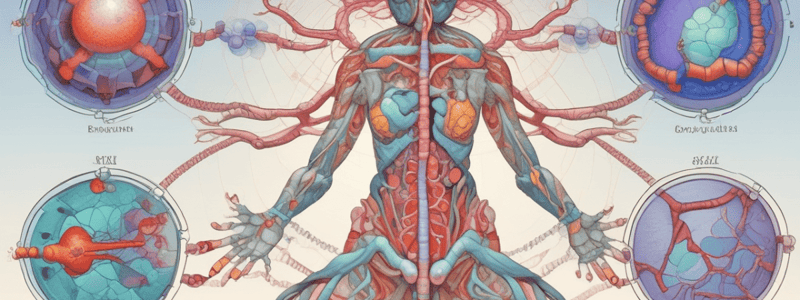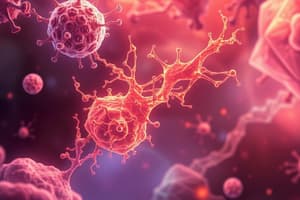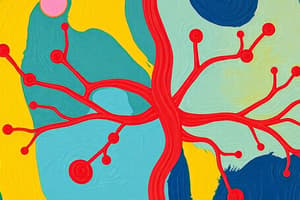Podcast
Questions and Answers
What is the primary location where aldosterone promotes the expression of Na+/K+ pump?
What is the primary location where aldosterone promotes the expression of Na+/K+ pump?
- Glomerulus of nephrons
- Distal tubules and collecting ducts of nephrons (correct)
- Juxtaglomerular cells of nephrons
- Proximal tubules of nephrons
What is the primary function of the renin-angiotensin-aldosterone system?
What is the primary function of the renin-angiotensin-aldosterone system?
- Regulation of plasma cortisol concentration and immune response
- Regulation of plasma sodium concentration and arterial blood pressure (correct)
- Regulation of plasma glucose concentration
- Regulation of plasma potassium concentration and heart rate
What is the effect of aldosterone on potassium ions in the kidney?
What is the effect of aldosterone on potassium ions in the kidney?
- Increases excretion of potassium ions (correct)
- Increases reabsorption of potassium ions
- Decreases excretion of potassium ions
- Decreases reabsorption of potassium ions
What is the primary location where aldosterone is synthesized and released?
What is the primary location where aldosterone is synthesized and released?
What is the primary stimulus for the release of renin into the general circulation?
What is the primary stimulus for the release of renin into the general circulation?
What is the primary function of heat shock protein 90 in the context of glucocorticoid receptors?
What is the primary function of heat shock protein 90 in the context of glucocorticoid receptors?
What is the primary binding site of aldosterone in the blood?
What is the primary binding site of aldosterone in the blood?
What is the primary tissue-specific effect of glucocorticoids?
What is the primary tissue-specific effect of glucocorticoids?
What is the primary function of the zona reticularis in the adrenal cortex?
What is the primary function of the zona reticularis in the adrenal cortex?
Which of the following hormones partially regulates the secretion of DHEA and androstenedione?
Which of the following hormones partially regulates the secretion of DHEA and androstenedione?
What is the primary function of alpha-1 receptors in the adrenal medulla?
What is the primary function of alpha-1 receptors in the adrenal medulla?
Which of the following is NOT a response to the 'fight or flight' response stimulated by adrenaline and noradrenaline?
Which of the following is NOT a response to the 'fight or flight' response stimulated by adrenaline and noradrenaline?
What is the primary function of chromaffin cells in the adrenal medulla?
What is the primary function of chromaffin cells in the adrenal medulla?
Which of the following is a response to adrenaline and noradrenaline stimulation in the central nervous system?
Which of the following is a response to adrenaline and noradrenaline stimulation in the central nervous system?
What is the primary function of beta-2 receptors in the adrenal medulla?
What is the primary function of beta-2 receptors in the adrenal medulla?
Which of the following is a response to adrenaline and noradrenaline stimulation in the cardiovascular system?
Which of the following is a response to adrenaline and noradrenaline stimulation in the cardiovascular system?
What is the primary mechanism by which angiotensin II increases blood pressure?
What is the primary mechanism by which angiotensin II increases blood pressure?
What is the primary glucocorticoid hormone in humans?
What is the primary glucocorticoid hormone in humans?
What is the effect of ACTH over-secretion on the adrenal cortex?
What is the effect of ACTH over-secretion on the adrenal cortex?
What is the primary mechanism by which cortisol exerts its anti-inflammatory effects?
What is the primary mechanism by which cortisol exerts its anti-inflammatory effects?
What is the effect of cortisol on proteolysis in most tissues?
What is the effect of cortisol on proteolysis in most tissues?
What is the primary mechanism by which the renin-angiotensin-aldosterone system increases blood pressure?
What is the primary mechanism by which the renin-angiotensin-aldosterone system increases blood pressure?
What is the effect of angiotensin II on the adrenal cortex?
What is the effect of angiotensin II on the adrenal cortex?
What is the primary mechanism by which cortisol regulates its own secretion?
What is the primary mechanism by which cortisol regulates its own secretion?
What is the effect of ACTH on the adrenal cortex?
What is the effect of ACTH on the adrenal cortex?
What is the primary mechanism by which cortisol regulates glucose metabolism?
What is the primary mechanism by which cortisol regulates glucose metabolism?
Flashcards are hidden until you start studying
Study Notes
Heat Shock Protein 90
- Receptor-ligand complex translocates to the nucleus
- Dimerisation with other receptors can occur
- Receptors bind to response elements (e.g. glucocorticoid response elements; GREs) or other transcription factors
Adrenal Cortex - Aldosterone
- Aldosterone is the most abundant mineralocorticoid
- Synthesised and released by the zona glomerulosa of the adrenal cortex
- Lipophilic, so in blood, it binds mainly to serum albumin and to a lesser extent, corticosteroid-binding globulin (CBG)
- Has intracellular receptors (aldosterone receptors: nuclear mineralocorticoid receptors)
- Plays a central role in the regulation of plasma Na+, K+, and arterial blood pressure, and is a key component of the renin-angiotensin-aldosterone system (RAAS)
- Mainly acts in the distal tubules and collecting ducts of nephrons in the kidney, promoting the expression of Na+/K+ pump, causing reabsorption of Na+ and excretion of K+, thereby influencing water retention, blood volume, and blood pressure
Renin-Angiotensin-Aldosterone System
- RAAS regulates plasma sodium concentration and arterial blood pressure
- If plasma Na+ or kidney blood flow falls, the juxtaglomerular cells of the nephrons are activated, releasing the enzyme renin into the general circulation
- Blood pressure drop or blood volume loss can also stimulate the release of renin via baroreceptors in the carotid sinus
- Renin acts on its target protein angiotensinogen, releasing angiotensin I
- Angiotensin I is further cleaved to Angiotensin II by the angiotensin-converting enzyme (ACE) primarily within the capillaries of the lungs
- Angiotensin II is the biologically active product of the RAAS
- Angiotensin II:
- A potent vasoconstrictor, causing arterioles to constrict, resulting in increased arterial blood pressure
- Stimulates the adrenal cortex to secrete aldosterone
- Increases the release of antidiuretic hormone (ADH) from the posterior pituitary
Adrenal Cortex - Cortisol
- Cortisol is the primary glucocorticoid hormone in humans
- Synthesised and released by the zona fasiculata in response to ACTH
- Inhibits CRH and ACTH release via negative feedback to the hypothalamus and anterior pituitary (HPA axis)
- Lipophilic, so in blood, it is mainly bound to corticosteroid-binding globulin (CBG) and serum albumin
- Acts via glucocorticoid receptors (intracellular receptors of the nuclear receptor family) which exert their actions by regulating gene transcription
ACTH Synthesis and Actions
- ACTH is derived from pro-opiomelanocortin (POMC)
- ACTH is hydrophilic and acts on high affinity G-protein coupled receptors (GPRCs) on the plasma membrane of target cells
- GPRCs for ACTH are a type of melanocortin receptor (MC2) which use cAMP as a second messenger
- ACTH binding to its receptors leads to activation of cholesterol esterase, increasing the conversion of cholesterol esters to free cholesterol, and also stimulates other steps in the synthesis of cortisol from cholesterol
Adrenal Cortex - Androgens
- Dehydroepiandrosterone (DHEA) and androstenedione are weak androgens secreted by the zona reticularis
- Partially regulated by ACTH and CRH
- In males, DHEA is converted to testosterone in the testes
- In females, adrenal androgens promote libido and are converted to oestrogens by other tissues
Adrenal Medulla
- Adrenal medulla is a modified sympathetic ganglion of the autonomic nervous system (ANS)
- Chromaffin cells in the adrenal medulla lack axons, but act as postganglionic nerve fibres, releasing catecholamines into the circulation
- Catecholamines:
- Adrenaline (~80%) is used to treat anaphylaxis, since it causes vasoconstriction
- Noradrenaline (~20%)
Catecholamine Actions
- Adrenaline and noradrenaline stimulate G-protein coupled receptors (GPCRs)
- There are two main types of adrenergic receptors: alpha and beta
- Adrenaline and noradrenaline have effects on the:
- Cardiovascular system (increased cardiac output, increased blood supply to skeletal muscles)
- Central nervous system (increased mental alertness)
- Carbohydrate metabolism (increased glycogenolysis in liver and skeletal muscles)
- Lipid metabolism (increased lipolysis in adipose tissue)
Studying That Suits You
Use AI to generate personalized quizzes and flashcards to suit your learning preferences.




